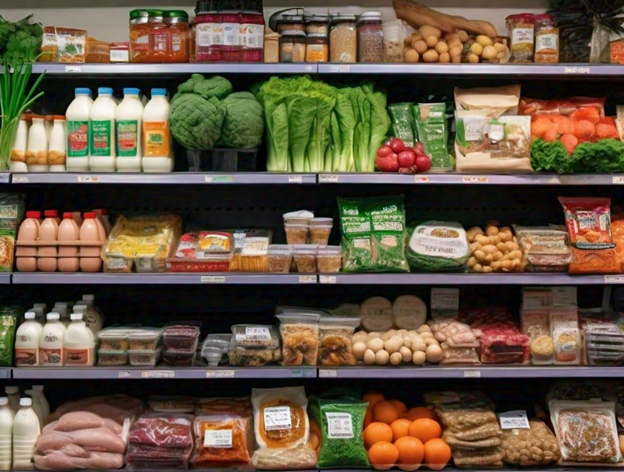How To Become Taller Naturally: Here Are 12 Best Foods That Make You Taller
How to become taller naturally: A balanced diet full of vital nutrients is crucial if you want to foster optimal growth and possibly grow tall.
How To Become Taller Naturally: 12 Best Foods That Make You Taller
The top twelve foods to support healthy growth are listed below:
Milk:
A large portion of the diet of many people across the globe consists of milk, a nutrient-rich liquid secreted by the mammary glands of mammals. When mammals are young and unable to digest other foods, this is their main source of nutrition. Humans place a premium on milk due to its abundance of growth- and bone-supporting elements, including calcium, protein, vitamin D, and phosphorus. F
or healthy bone and tooth development, milk is an excellent source of calcium, and vitamin D aids in calcium absorption. Muscle growth and repair are facilitated by protein, an essential building block for proper development and maturation. Milk may aid in reaching one’s ideal height by supplying these necessary nutrients, which in turn encourage healthy growth in children and teenagers. To maximize one’s genetic potential for height, it’s important to drink milk regularly eat a balanced diet, and lead an active lifestyle with enough sleep and exercise.
Eggs:
The eggs laid by female animals, most often hens, are a multipurpose and incredibly healthy food source. Because of the abundance of nutrients they provide, they are a mainstay in many people’s diets. Eggs are a great way to get the high-quality protein your body needs, which is essential for building and repairing muscles and other structures. They are rich in minerals and vitamins, including selenium, riboflavin, vitamin B12, and vitamin D.
The absorption of calcium and the maintenance of healthy bones are fundamental for physical development, and vitamin D, which is present in egg yolks, is an important factor in both. Furthermore, proteins, which are essential for the growth of skeletal and other tissues, are derived from the amino acids found in eggs. Adolescents and children who eat eggs regularly as part of a healthy diet are more likely to reach their maximum height potential. To promote healthy development and general well-being, it is recommended to eat eggs regularly in addition to other nutrient-dense foods, get enough sleep, and exercise regularly.
Chicken:
The high protein content and adaptability of chicken make it a popular poultry product. Muscles and bones, among other tissues, rely on the high-quality protein they offer for their development, healing, and maintenance. Vitamins B6, B12, phosphorous, and zinc are just a few of the minerals and vitamins found in abundance in chicken. All things considered, these nutrients are vital for development and growth because of the functions they play in metabolism, energy generation, and immunological function.
Chicken is a good source of protein because it encourages the body to make more growth hormones, which are essential for physical development during adolescence. Additionally, collagen, a crucial component of bone tissue, can only be synthesized using amino acids that are present in chicken. If kids and teens eat a healthy, well-rounded diet that includes chicken and other nutrient-rich foods, get plenty of exercise, and get enough sleep, they will be able to grow to their full height potential.
Leafy Greens:
Vegetables that are known as “leafy greens” are easily identified by their brightly colored, edible leaves. Some examples of greens are chard, collards, spinach, and kale. These veggies are a nutrient treasure trove, full of growth- and health-promoting vitamins and minerals. Vitamins A, C, K, and folate are abundant in them, and so are magnesium, potassium, calcium, and vitamin C. Building and maintaining healthy bones is critical for reaching one’s full height potential, and calcium and vitamin K play an important role in this process.
Vitamin C helps the body make collagen, a protein that gives bones their structure. Magnesium and potassium also play a role in maintaining bone density and proper muscular function. Folate, abundant in leafy greens, also helps cells divide and expand, especially for kids and teens going through their fast growth spurts.
A balanced diet that includes a range of leafy greens can help supply the nutrients needed for healthy growth and development, which can aid in the possibility of increased height. Suppose people follow a healthy lifestyle that includes getting enough sleep and being physically active, in addition to regularly eating these nutrient-dense veggies. In that case, they will be able to support overall growth and achieve their maximum height potential.
Yogurt
Fermenting milk with good bacteria, usually species of Lactobacillus and Streptococcus, yields yogurt. Yogurt gets its signature sour flavor and velvety texture from this process, which also improves its nutritional profile. Protein, calcium, vitamin D, and beneficial bacteria abound in yogurt. During the formative years of a child’s life, protein-rich foods like yogurt are vital for building muscle and repairing damaged tissues.
Bone health is closely tied to the absorption of calcium and vitamin D. While calcium is the main component of bones, vitamin D enhances calcium absorption, which in turn increases bone density and strength. Improved nutrient absorption and general health can be achieved by maintaining a healthy gut flora, which is supported by the probiotics included in yogurt. Yogurt has several vital minerals that promote bone growth and development, which may help with growing taller. Yogurt, when combined with a nutritious diet, enough sleep, and regular exercise, can greatly aid in optimal growth and assist kids and teens attain their maximum height potential.
Fish:
Fish is a highly nutritious food that contains high-quality protein, vital fatty acids, vitamins, and minerals. Salmon, mackerel, sardines, and tuna are particularly recognized for their high concentrations of omega-3 fatty acids, vitamin D, calcium, and phosphorus. Protein is essential for tissue growth and repair, including muscle and bone growth, hence it is an important component of a diet that promotes height gain. Omega-3 fatty acids improve bone health by lowering inflammation and increasing bone density. Vitamin D is required for calcium absorption, which is crucial for the formation and maintenance of strong bones. Furthermore, fish’s phosphorus and calcium work together to create and preserve bone structure.
Nuts and Seeds:
Nuts and seeds are high in nutrients and a great source of proteins, healthy fats, vitamins, and minerals. Almonds, walnuts, and cashews are a few types of nuts, whereas chia, flax, and sunflower seeds are prominent types of seeds. The essential fatty acids omega-3 and omega-6, which are critical for general health and development, are especially abundant in certain foods. They also have a sizable protein content, which is essential for the development and maintenance of tissues, including bones and muscles. Furthermore, nuts and seeds are a great source of zinc, phosphorus, magnesium, and calcium—all of which are necessary for the growth and health of bones.
Magnesium aids in the development and maintenance of bones, while calcium, phosphorus, and other elements are necessary for strong bones. Cell growth and division, which are necessary for healthy development during childhood and adolescence, are processes in which zinc is involved. A balanced diet that includes a range of nuts and seeds can supply these essential elements that promote height growth. Regular consumption of these foods, in conjunction with other nutrient-dense meals, sufficient rest, and regular exercise, can help guarantee that kids and teenagers grow to their maximum potential and preserve their general health.
Whole Grains:
Whole grains are made up of the bran, germ, and endosperm, the three components that make up a grain kernel. Brown rice, whole wheat, quinoa, oats, barley, and millet are typical examples. These grains are rich in fiber, minerals (including iron, magnesium, and selenium), vitamins (particularly B vitamins like thiamine, riboflavin, niacin, and folate), and complex carbohydrates. Because growing children and teenagers lead active lifestyles, whole grains offer a consistent supply of energy.
Whole grains contain B vitamins, which are essential for energy metabolism and nervous system health, both of which promote general growth and development. Hemoglobin, which transports oxygen to the body’s cells, particularly those engaged in growth activities, is made possible only by iron. Because it aids in the development of new bone tissue and the control of calcium levels, magnesium is crucial for the health of bones. Furthermore, the dietary fiber found in whole grains facilitates digestion and supports intestinal health, which guarantees optimal absorption of minerals.
These essential nutrients can be obtained by including whole grains in a balanced diet, which will support the body’s growth and enable kids and teenagers to attain their full potential in terms of height. In conjunction with other nutrient-dense diets, sufficient rest, and consistent exercise, whole grains support healthy growth and general well-being.
Berries:
The small, vibrant fruits known as berries—which include blueberries, raspberries, blackberries, strawberries, and cranberries—are prized for having an abundance of nutrients. They are especially rich in fiber, vitamins, minerals, and antioxidants. Vitamin C is one of the key nutrients found in berries. It is necessary for the creation of collagen, which aids in the development and maintenance of strong bones and connective tissues.
Berries include vitamin K, which promotes bone metabolism and increases bone density. Antioxidants like flavonoids and anthocyanins shield developing cells from oxidative damage, improving general health at vital stages of growth. Berries contain fiber, which promotes healthy digestion and nutrient absorption so the body can consume the resources needed for growth. Another essential element, manganese, promotes bone growth and metabolic functions.
Legumes:
Legumes are a broad category of plants distinguished by their high protein and nutrient content. They include beans, lentils, chickpeas, peas, and soybeans. Nutrients like as protein, fiber, iron, magnesium, and potassium, vitamins (particularly folate and B vitamins), and phytonutrients are abundant in them. Legumes provide protein that promotes muscular growth and iron that helps transport oxygen, both of which are necessary for general growth and development.
Assuring effective nutrient absorption for growth, the fiber content supports digestive health. Legumes include folate and B vitamins, which are essential for cell division and growth activities. Furthermore, minerals that promote bone health and height growth include potassium and magnesium. These vital nutrients can be obtained from legumes in a balanced diet, supporting healthy growth in childhood and adolescence.
Sweet Potatoes:
Sweet potatoes are colorful orange root vegetables that are high in nutrients and have a sweet taste. They are a good source of fiber, antioxidants, minerals, and vitamins. Vitamin A, which is necessary for the growth and development of bones, is especially abundant in sweet potatoes. Additionally, vitamin A is important for healthy vision and the immune system. Sweet potatoes also have high vitamin C content, which promotes the synthesis of collagen and strengthens bone and tissue. Sweet potatoes’ high fiber content helps with proper digestion and nutrient absorption, both of which are essential for general growth.
Sweet potatoes provide minerals like potassium and manganese that assist growth during childhood and adolescence by supporting bone health and metabolic functions. These vital nutrients can be obtained from sweet potatoes in a balanced diet, supporting healthy growth of stature and general well-being.
Cheese:
Dairy products like cheese are created from milk by coagulating, separating the whey, and letting it age. It provides a bountiful supply of vital nutrients, including vitamin B12, calcium, phosphorus, D, and protein. Particularly during youth and adolescence, these nutrients are essential for promoting growth.
Cheese’s protein helps build and repair muscles, and its calcium and phosphorus content helps maintain strong, dense bones that support height growth. Bone health is enhanced by vitamin D, which facilitates the body’s efficient absorption of calcium. Red blood cell synthesis, which is necessary for general growth and energy levels, is supported by vitamin B12. These vital nutrients can be obtained from cheese in a balanced diet, helping kids and teenagers grow to their full potential in terms of height.


